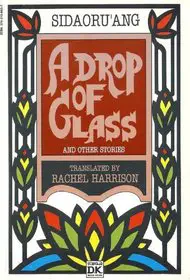 A Drop of Glass and Other Stories is a collection of short stories by Sidaoru’ang is the pen name of Wanna Sawatsi, a Thai fiction writer. She was born in 1943. The stories were translated from Thai by Rachel Harrison.
A Drop of Glass and Other Stories is a collection of short stories by Sidaoru’ang is the pen name of Wanna Sawatsi, a Thai fiction writer. She was born in 1943. The stories were translated from Thai by Rachel Harrison.
A Drop of Glass by Sidaoru’ang is a socialist-realist short story about the hardships that Thai factory workers have to deal with on a daily basis. Although there is no real main character, still the story focuses, at least at first, on Anong, a young woman from the country side whose job was to “pick up each glass, held it to the light and examine it closely. If she found any bubbles or scratches in it, she put it into one box; those which were perfects she put into another.”
Living in very poor conditions, Anong sends most of her salary back home while „she could not help wishing she had a proper bed to lie on, with a proper pillow and mattress.” She has to suffer at the scrupulous nature of the factory’s manager who blames her for not doing her designated job properly. Mr. Liang, the driver, tells her that she should accept the criticism because “We’re just poor people and we have to go along with what they say. You can take it. Just ignore them. We’ve all got something or other that makes us feel low, you know. I’m just the same. … But then you’re a girl. There’s nothing you can do. The only thing for you to do is not let it bother you. Just get on with your work, that’s the best way.”
But, when Anong is chastised and the driver and foreman are fired for trying to speak up for the others, something unexpected happens: „The owners of the nearby factories looked at all the workers and were alarmed at what they saw, for there were not just workers from the glass factory, but also some of their own workers, from the sugar factory and the sacking factory nearby.”
Go Slay Suriya in the Jungle! by Sidaoru’ang is an essay-like short story about the changes that likay, a form of Thai folk, has undergone through the years: “But now the old-fashioned likay of the paddy field era has given way to that of the market era and the age-old tradition of a proper prologue has disappeared.”
The writer, “a country girl of peasant stock, and a long standing likay fan,” recalls how “For many months now this newly-opened market down the soi had always put on a free likay show for all the old folk who did their shopping there.” Nowadays, the likay in the big cities, such as Bangkok, is used as a marketing tool to attract customers: “When new shop-houses and markets are nearing completion, it is customary for the owner to stage a likay performance to encourage people – those lovely people, all those lovely people – to come and buy things in the market.”
The short story ends in a positive not, with the author asking herself what would become of her and her dreams of making it as a writer: “I am hoping that one day in the future my short stories will be performed as likay”…
Father by Sidaoru’ang is a sentimental short story about the struggle of the Thai lower classes with the harsh reality. Father is a modest man with a big family trying to make an honest living by working at the local railway station in Bang Krathum, “just a small station, so small that the passengers on the fast trains and the express trains were not interested in its inhabitants, nor they in them.”
He lived, together with his extended family crammed in a small house where “There was hardly any room left and they all lay so tightly packed together that the net was pulled taut on all sides.”
The many years Father worked, “clad in a kaki uniform,” as the station’s dogsbody eventually take their toll and reduced him “to a virtual invalid, unable to do anything for himself.”
Feeling guilty for his failure to give his family a happier life he decides to put an end to all the suffering: “He felt truly ashamed. Throughout his married life they had never been well off. Instead things had simply gone from bad to worse as time went on; and all this despite the fact that his neighbours were always going on about what a good man he was…”

